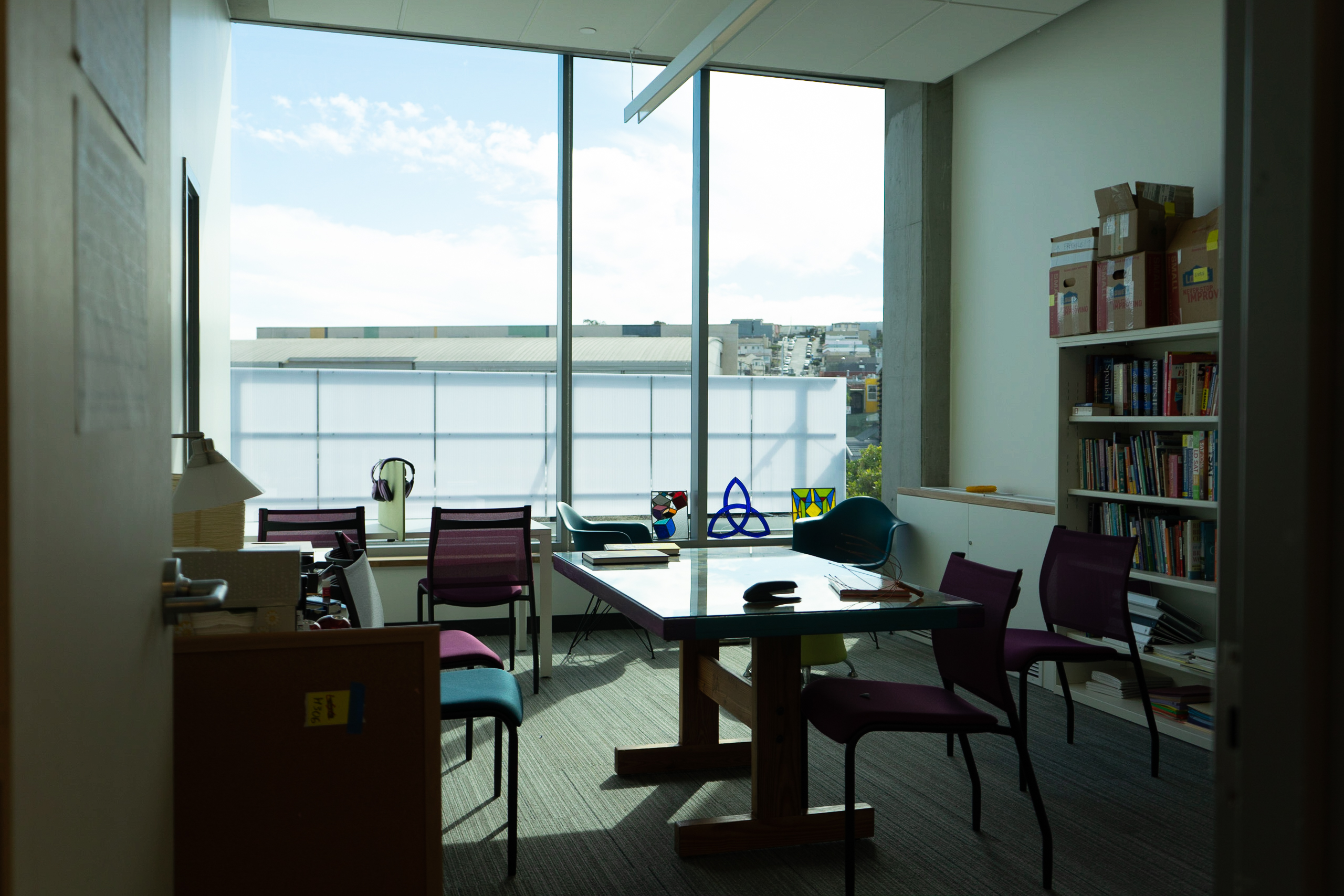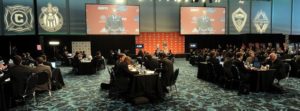Over the past several years, Lick-Wilmerding has grappled with how to discuss sensitive issues, such as race, gender, and sexuality, in order to more deeply understand the experiences of marginalized groups. These conversations have led to a positive movement towards a more inclusive student body and faculty. However, one core identifier has not been discussed as publicly as others: ability.
“Basically, someone’s ability is how easily they are able to do a thing.” Winifred Montgomery, director of Lick’s Learning Strategies Center (LSC), said. “It’s a broad definition because ability encompasses a lot of different things. Some aspects of one’s ability are innate, or hardwired, and other things are entirely based on experience and effort.”
For the past 12 years, Montgomery has served as the director of the LSC, the on-campus resource concerned with “leveling the playing field for students with diagnosed learning and attentional differences or physical disorders to create equity in the classroom.”
One of these students, Ava Grey ‘21, has done extensive work with the LSC in order to navigate her symptoms of dyslexia and ADD.
“I don’t think many people realize just how much of an impact a learning difference has,” Grey said. “In a class where the teacher is giving a presentation, I can miss 80% of the information. Reading homework for me can take double or triple the length it does for other kids.” She remarked how her experiences with ability have affected all aspects of her life, both within and outside of class: “it’s harder to follow conversations between friends, play sports, [and] manage the homework load.”
Students like Grey are not anomalous. According to Montgomery’s estimates, “about one-third” of the student body seeks some form of aid from the LSC during their time at Lick-Wilmerding. Students seek help for a multitude of reasons: difficulties from diagnosed learning differences—such as attention disorders (ADD and ADHD), dyslexia, and dyscalculia—to test-taking anxiety or organizational issues. Although the LSC’s program is designed to cater primarily to students with diagnosed learning differences, they aim to aid any and all students looking for help in the classroom. Despite high involvement with the program, many neurotypical students, or students who do not have any atypical cognitive patterns, remain unaware of the significance of the services the LSC provides.
Over the course of high school, students involved with the LSC undergo hours of rigorous testing, write academic profiles outlining their specific strengths and weaknesses in the learning process, and develop tools to enable them to “use their strengths to manage their weaknesses.” Even with this laborious process, neurodiverse students still grapple with the longer time allotted to homework, difficulty in class, and the social stigma surrounding their difference.
“A lot of ninth grade students come from middle schools in which they did not get as much assistance. So they are really still ashamed of [their learning difference] when they come here,” Montgomery noted. This stigma, although somewhat alleviated through the insights and strategies learned in the LSC’s program, still follows students throughout their academic career: “I have had wonderfully smart kids, kids who have gotten into elite colleges and who are brilliant thinkers,” Montgomery said, “but they might be perceived as being less intelligent purely because they process or express their thoughts more slowly.”
The most prominent way this stigma manifests is also one of the most damaging: fear of looking less intelligent or weaker than peers often makes students afraid to start conversations about their neurological differences.This silence comes with unfortunate results: “We don’t really talk about ability that much, so people don’t really know how to talk about it,” Elliot Rosenberg ‘19, Student Council’s Co-Inclusion Chair, noted “Oftentimes, I have noticed even when we do have conversations about ability, those conversations tend to be about how little we speak about it.”
Due to the lack of awareness, many neurotypical or able-bodied students have inadvertently used harmful language when discussing issues pertaining to ability. A common, harmful idea among neurotypical students noted by both Montgomery and Grey is that accommodations such as extended time are enviable advantages rather than a necessary means to create equity for neurodiverse students.
Accommodations through the LSC “are based very specifically [on] what are called functional limitations,” said Montgomery. Functional limitations vary greatly in terms of type, severity, and effect on the student, so the accommodations used to treat them vary as well.
“Almost everybody needs exactly the amount of time they are approved for,” Montgomery said. “For a lot of my students it is really painful when neurotypical kids are like, ‘You’re so lucky, you get extended time!’ when they feel like ‘I wish I didn’t need it! I wish it didn’t take me three times as long to read as it takes you!’”
Grey similarly noted, “I hear a lot of self-diagnosis. I hear people saying things like ‘Oh this reading is so hard for me, I am so dyslexic!’”
Moreover, students interviewed have noticed the use of harmful and antiquated language surrounding people with disabilities. Words like “r*tarded,” jokes at the expense of people with physical or mental disabilities, and casual slights about ability are often met with little reaction.
“There isn’t much visibility on campus, which I think is where a lot of the ignorance comes from,” Rosenberg said. “It’s a motivation thing. If you are more willing to learn about new things you’ll learn more. If you don’t necessarily see a pressing need to change, you are less motivated. I hadn’t had much experiences myself with talking about ability before meeting my step-brother.”
Rosenberg’s step-brother, Jack “has pretty severe cerebral palsy that has made him limited in mobility and speech.” His brother’s condition necessitates the use of a wheelchair for mobility; when Jack visited Lick before the renovations, he struggled to get around.
“The stairs made it really difficult for him to get around. There were some accommodations, like the chair lift in the gym and the elevator in the library, but those were both very slow and noisy.” The new building has fortunately been outfitted with better accommodations for people with physical disabilities, such as an improved elevator and ramp up to the front entrance. Along with providing better conditions for visiting friends and relatives, these accommodations ultimately provide a chance for students with physical disabilities who were previously unable to attend Lick, a chance to enroll.
Physical changes in accessibility are not the only ones happening on campus Drawing on his experience with his brother, Rosenberg has spearheaded efforts to bring ability into student consciousness through a workshop for Walk with a Purpose and efforts “to bring in ability—especially physical ability—whenever possible in class conversation.”
“I think a lot of the time, the only experience or knowledge kids have about ability is from TV, which can be very problematic depictions,” Rosenberg said. Rosenberg noted the idea of “inspiration porn,” or the portrayal of people with disabilities as inspirationally “overcoming” their difference. This furthers the narrative that one’s ability is a challenge to be overcome, undermining people with disabilities
“When I was hired, there was a pretty explicit focus on changing the school culture,” Montgomery recalled. Through her time at the school, she has worked to increase awareness about neurodiversity within the administration through presentations and outreach.
However, many students feel that while faculty awareness of neurodiversity has improved, knowledge within the student body has remained stagnant. “I think an issue we have…is that a lot of the information being spread about it is to the students who are already diagnosed, not the whole student body,” Grey said. “I think it’s really important for students who don’t know what it’s like to have a learning difference to be more sensitive.”
Rosenberg looks forward: “I think that people around here want to learn, so I am hopeful that they will.”
“I think a curious, empathetic mindset will always help,” suggested Montgomery. “Honest questions get you far.”
Although progress towards a more inclusive student community may come gradually, small changes can make a great impact in the greater inclusion of neurodiverse students. Through increased conversation and awareness, students such as Rosenberg and Grey. as well as the LSC faculty hope to empower an equitable educational experience—regardless of one’s ability.






